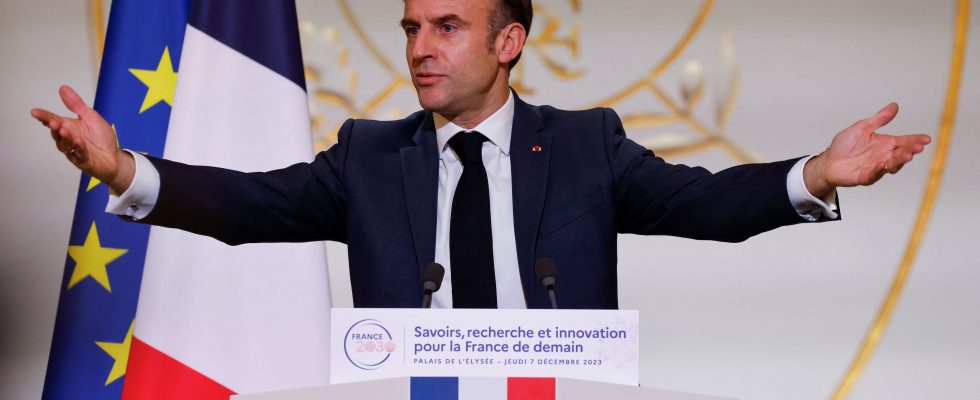Emmanuel Macron launched, this Thursday, December 7, major work to reorganize French public research so that the country remains “a great nation of knowledge”, reopening the high-risk project of university autonomy.
“Within eighteen months”, the Head of State announced from the Elysée where he had brought together several dozen researchers, a “real revolution” for the entire research system, often criticized for its great complexity and bureaucratic burdens.
Objective: to remedy a “fragmentation” which weakens the global position of French researchers and ultimately France’s capacity to be at the forefront of scientific innovations.
Downgrading risk
“This disorderly fragmentation deprives us of focusing on major shared challenges, prevents us from being reactive in emergencies and reduces our ability sometimes to be attractive in the world,” he said. In the background, Emmanuel Macron deplored the “strange defeat” of the Covid-19 vaccine, France having discovered the principle of messenger RNA but not having been able to develop the remedy. “France went from sixth to ninth place between 2005 and 2017 in terms of volume but also quality of publications,” the President of the Republic further recalled.
Faced with the risk of downgrading, but without forgetting to boast of his results since 2017 with the billions promised by the research programming law (+25 billion over 10 years) and those of the France 2030 investment program, Emmanuel Macron decided to initiate a vast transformation of the role and missions of major national research organizations, such as the CNRS, Inserm, Inrae and the CEA. They must transform themselves “into real program agencies”, which will be “strategists” in their field for the entire public research eco-system. He also promised a “shock of confidence” for researchers whom he wants to rid of all “bureaucracy”.
The Head of State also installed a “Presidential Science Council” responsible for enlightening him on the scientific challenges of the future, made up of around ten researchers including Nobel Prize winners in physics Alain Aspect and in economics Jean Tirole, and the mathematician Hugo Duminil-Copin, winner of the Fields medal.
For Jean-Michel Minovez, head of the research sector of Snesup-FSU, the leading higher education and research union, the announcements by the Head of State amount to “hyper-presidentialization” and “management by the high”. The trade unionist criticizes a logic of “planning” which “endangers fundamental research” and “prevents the emergence of discoveries which are the fruit of a long collaborative process”.
“Without taboo”
By unveiling this new roadmap, Emmanuel Macron took the opportunity to advocate more “autonomy” for universities so that they “organize and manage research” at the local level, according to “site logic”.
“What I am proposing to them is within eighteen months to open act two of autonomy and move towards true autonomy,” he said. “We must move forward without taboo” on “the issues of governance, economic model and, in fact, build real contracts of objectives, means and performance with much more incentive financing”, he added.
The president was careful not to mention a change in the “status” of higher education and research staff, a real casus belli for the sector’s unions. Act one of autonomy, under the presidency of Nicolas Sarkozy, gave rise to a long standoff between the executive and the teacher-researchers joined by the student unions during the winter of 2007/2008.
The Freedom and Responsibilities of Universities (LRU) law of August 2007, known as the “Pécresse law”, transformed the governance of universities by giving them more autonomy: establishments manage their budget (the main axes are no longer predetermined by the State) and their human resources (notably the payroll). This “act 2” of autonomy risks “reinforcing competition between universities and deconstructing the idea of a public service of national interest”, warns Hugo Harari-Kermadec, teacher-researcher at the University of ‘Orléans, specialist in the economics of higher education and research.
